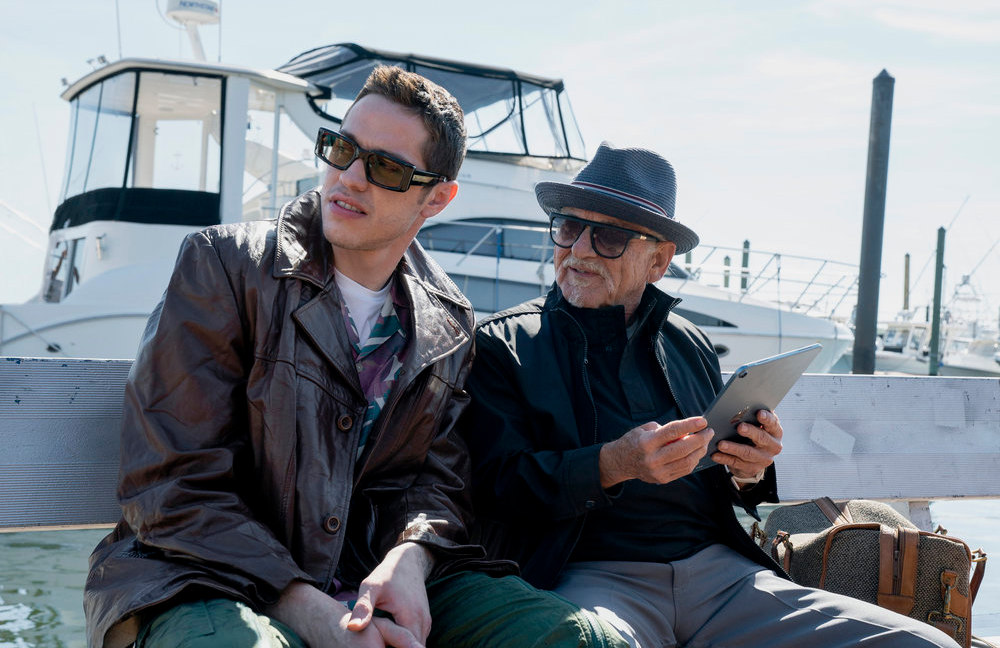Pete Davidson's Exhausting New Comedy Tries to Be Everything, But It's Bupkis
-
Pete Davidson and Joe Pesci in Bupkis (Photo: Heidi Gutman/Peacock)
Pete Davidson hasn’t exactly been shy about sharing the intimate details of his life. His time on Saturday Night Live was defined by his Weekend Update appearances, in which he freely discussed his relationships, his family, and his struggle with addiction. Then, in between tabloid appearances, Davidson wrote and starred in The King of Staten Island, a mostly autobiographical 2020 film. His latest project, Peacock’s Bupkis, is more of the same, and it turns out there’s not much left to discover about him.
In the series, Davidson plays a semi-fictionalized version of himself, who is still very much drinking and doing drugs. (In real life, he has been in and out of rehab in recent years and is currently practicing sobriety.) He lives with his mom Amy (Edie Falco), but since he’s the one who bought the house, he’s quick to point out that she technically lives with him. He spends most of his time with his grandpa (Joe Pesci) or with a group of ne'er-do-well friends who are not-so-subtly riding his coattails. Things play out as if they’re happening right now, in spring of 2023. Just like the actual Davidson, the Bupkis version of Pete is 29, no longer on Saturday Night Live, and starting to get booked on big-budget films. The King of Staten Island also exists in the TV version of his world — while exerting her dominance in a restaurant, Amy shouts, “Marisa Tomei played me in the movie!”
Because so much of the show seems to mirror what Davidson is experiencing in real time, it’s clear he hasn’t gotten enough distance to separate himself from that life and offer more meaningful reflection. It’s part of what makes everything feel jumbled. With more time to process before putting certain events on screen, Davidson might have found connective threads to unite his many ideas. Instead Bupkis plays like a collection of disparate journal entries that only really make sense to him.
Bupkis’s biggest roadblock, though, is its tonal dissonance. The first episode sets up the series as an outrageous and raunchy hang-out comedy. This is just a day in Pete’s life as he maneuvers through family drama and career expectations. The second episode is more introspective, flashing back to when, as a young boy, Pete had his first sip of alcohol and buddied up with his cocaine-addicted uncle. It also digs into Amy’s story, showing her struggle to figure out the rest of her life in the wake of her husband’s death. It’s a more somber, but more interesting look at what turned Pete into the Pete we know today.
Later episodes completely change the storytelling style: There’s an homage to the Fast and Furious franchise, a dream-like episode that leaves Pete (and the audience) questioning what’s real and what’s not, and an episode shot in black and white. These are attempts to frame details from Davidson’s now well-trod stories of fame, family, and addiction in a new way. But it ultimately feels like Davidson is making use of the production’s resources to try something out just because he can. The exploration of new styles is admirable, but the execution feels like an unfinished project.
The excellent cast is the show’s bright spot. Falco is game to take on whatever is given to her, whether that means having a grounded, emotional breakdown or embracing silliness while going after an internet troll who’s tormenting her son. Pesci, on the other hand, shines by just being Pesci. He brings his best Goodfellas energy to the role of Pete’s no-nonsense Italian grandfather, someone who has no trouble delivering hard truths. Brad Garrett plays Pesci’s brother, and the charming scenes between them could justify a spinoff series.
The guest cast is also stacked: Al Gore, Steve Buscemi, Method Man, Jane Curtin, Machine Gun Kelly, J.J. Abrams, La La Anthony, and many more show up over the course of eight episodes, some as versions of themselves and some as fictional characters. In one of the most fully realized moments of the series, Davidson chats with John Mulaney. As in real life, the Bupkis Mulaney has just gotten out of rehab and is adjusting to life as a father, and his conversation with Pete is both touching and hilarious.
But scenes like these are overwhelmed as the show keeps veering in wildly different directions. The casting goes awry, for instance, when Garrett is there as a character, but Ray Romano is also there, playing himself. Real episodes of Everybody Loves Raymond even factor into a side story. It’s exhausting to keep track of all these gimmicks, but in that way, this unfocused show may actually reflect Davidson’s current position in life. But this lack of direction should define the character, not the series.
All eight episodes of Bupkis premiere May 4 on Peacock. Join the discussion about the show in our forums.
Brianna Wellen is a TV Reporter at Primetimer who became obsessed with television when her parents let her stay up late to watch E.R.
TOPICS: Bupkis, Peacock, Edie Falco, Joe Pesci, John Mulaney, Pete Davidson, Ray Romano
